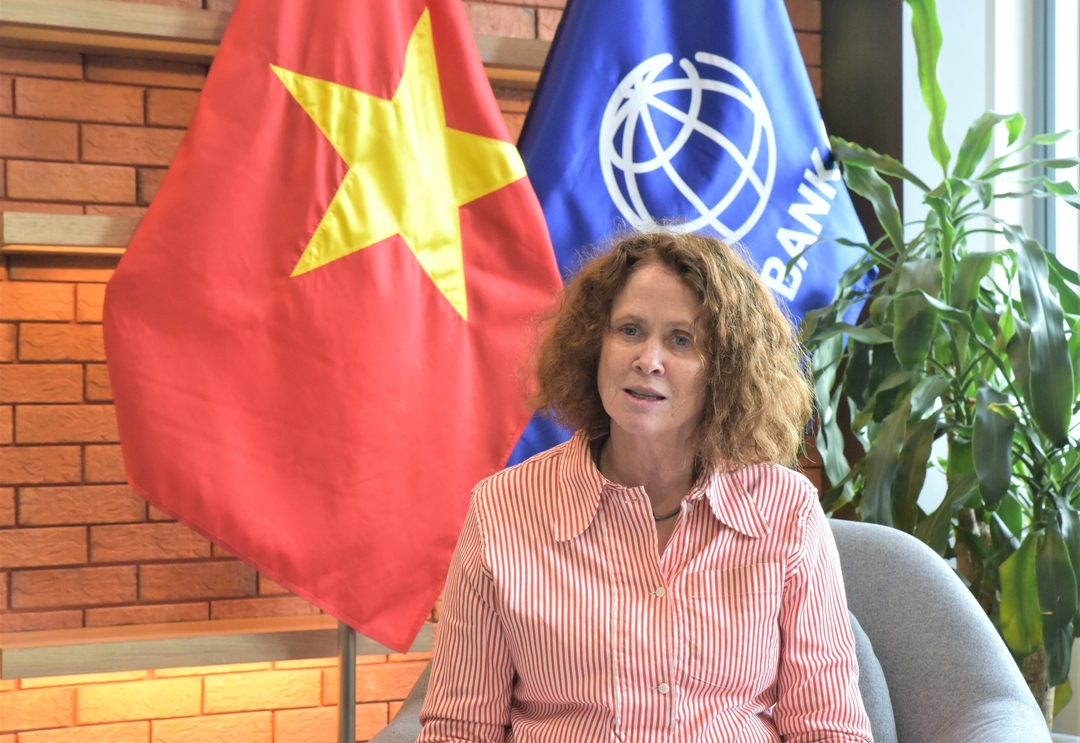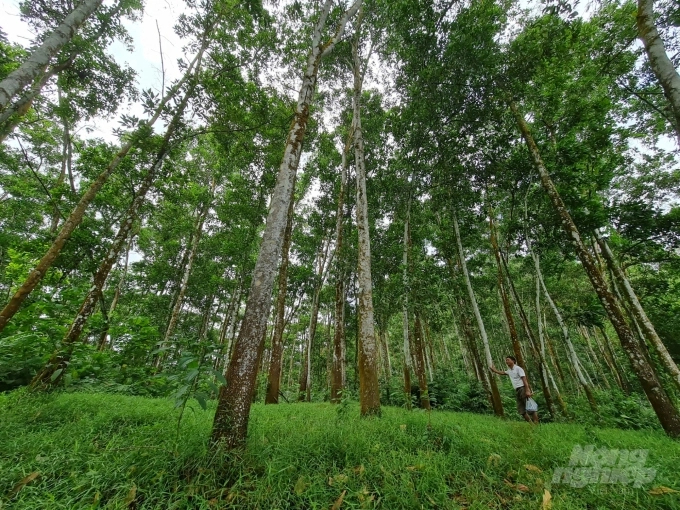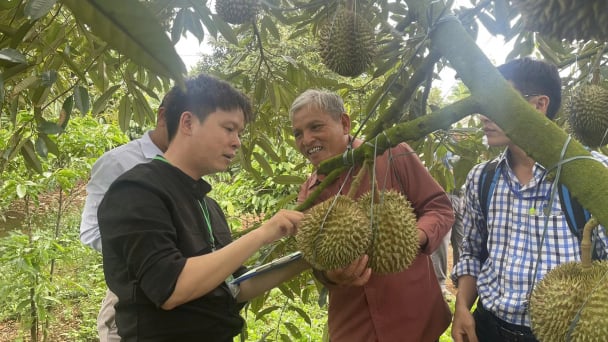June 1, 2025 | 09:30 GMT +7
June 1, 2025 | 09:30 GMT +7
Hotline: 0913.378.918
June 1, 2025 | 09:30 GMT +7
Hotline: 0913.378.918
Forestry is still a key component of Vietnam's agricultural growth toward sustainability. International partners' engagement in the efforts is also significant. Ms. Carolyn Turk, World Bank Country Director for Vietnam, spoke with Vietnam Agriculture News on how Vietnam can better protect, preserve, and improve the value of forest resources in the coming time.

Ms. Carolyn Turk, World Bank Country Director for Vietnam talks in an interview with Vietnam Agriculture News. Photo: Pham Hieu.
Vietnam boasts rich and diverse forest resources. In recent years, forest management, protection, and development issues have been continuously improved, benefiting the livelihoods, cultural and spiritual life of the community. How would you evaluate Vietnam's strategy and direction in this regard?
Healthy forests provide essential services and benefits, from biodiversity conservation to climate mitigation and economic and livelihood advantages for the country and its people.
Vietnam has implemented a range of strategic policies and practices to reverse the trend of deforestation over the past few decades. This includes an integrated approach to forest management, restoration of degraded forests, reforestation, and adoption of sustainable forest management practices. The country is also actively promoting green growth and climate strategies.
These efforts have resulted in significant achievements, such as an increase in national forest cover from 28% in the 1990s to 42% in 2021-2022, a rise in forest product exports from US$2 billion to US$16 billion during the 2005-2022 period, and the implementation of Payment for Forest Environmental Services (PFES) and carbon payment programs that incentivize forest protection, reinvestment in forests, and support for local forest-based livelihoods, mobilizing around US$300 million to date.
However, Vietnam still faces significant challenges in forest management, including forest degradation and localized deforestation, particularly in mangrove forests along the country's long coastline. These issues limit the potential for carbon sequestration and storage and expose the coast and its assets to climate risks. Localized deforestation still occurs due to competing land uses, such as agricultural expansion, industrial/infrastructure development, and illegal logging, which challenge the effective implementation of policies related to forest land conversion.
Moreover, most of Vietnam's plantations produce low-quality, fast-growing acacia used for woodchip production, and the country relies heavily on imported sawlogs for its growing export-oriented processing and furniture industry. To address this, Vietnam may need to adopt a better strategy that promotes longer rotation plantations for timber.
With its increasing participation in many trade agreements and international commitments on green development, circular economy, emission reduction, and the global timber trade chain, what role do Vietnam's forest resources play in fulfilling these commitments?
Vietnam's forest sector is a critical player in reducing emissions and increasing sequestration/removal to help offset emissions from other sectors, enabling the country to achieve its ambitious targets. The forest and other land use sector is expected to contribute to a net reduction of -95 million tons of CO2e by 2030 and -185 million tons of CO2e by 2050.
Vietnam has made strides in advancing its Reducing Emissions from Deforestation and Forest Degradation (REDD+) agenda, as evidenced by its signing of a US$51.5 million Emission Reductions Payment Agreement with the World Bank's Forest Carbon Partnership Facility in 2020. However, there is a need to scale up pilot activities to fully implement REDD+ and achieve the government's emission reduction targets from the Agriculture, Forestry, and Other Land Use (AFOLU) sector. This entails expanding the geographic coverage of REDD+ from pilot sizes to other jurisdictions and exploring financing options beyond donor funding, which may involve using international and/or domestic carbon trading schemes.

The World Bank has been working with MARD over the last few years to establish a legal framework to introduce carbon financing into the forestry sector.
To better protect, preserve, and promote the value of forest resources, what issues should Vietnam prioritize?
Although Vietnam has made significant progress in the forestry sector, there is still much more to be done. The World Bank has several ideas to contribute towards this goal.
Firstly, Vietnam needs to explore financial options to improve its forests in the coming years. Access to carbon markets could provide Vietnam with significant funding, estimated at hundreds of millions of dollars, to achieve this goal. However, this would require changes to the legal framework. The World Bank has been working with the Ministry of Agriculture and Rural Development (MARD) over the last few years to establish a legal framework to introduce carbon financing into the forestry sector. To ensure that these finances are readily available and channeled into the forestry sector more efficiently, our advice is to establish a permanent structure.
Secondly, Vietnam needs to strengthen coordination between different stakeholders. While forestry management falls under MARD's mandate, provinces, especially those in coastal areas, also have a crucial role to play in ensuring a resilient coastline. Hence, coordination between MARD, the Ministry of Natural Resources and Environment (MONRE), and the provinces is essential to achieve efficient and impactful investment in the forestry sector.
In what ways does the World Bank support Vietnam in its strategy of preserving, protecting, and developing forests?
Vietnam has a longstanding partnership with the World Bank in the forestry sector. Currently, the World Bank is engaged in two active forestry support projects in Vietnam, including the "Forest Sector Modernization and Coastal Resilience Enhancement Project," aimed at improving coastal forest management, and the "North Central Region Emission Reduction Program," which provides payment for initiatives to protect and restore forests.
As mentioned earlier, the World Bank has been collaborating with MARD to establish a legal framework for directing carbon finance into Vietnam's forestry sector. Moving forward, we can continue to work with Vietnam to gain a deeper understanding of critical challenges in the forestry sector, identify feasible solutions, and formulate a mid-term plan of action to help the sector deliver on its ambitious targets.

(VAN) This was the directive given by Deputy Minister Phung Duc Tien during a meeting with the Department of Livestock Production and Animal Health, and relevant stakeholders to prevent and control African swine fever.

(VAN) For the durian industry to succeed, the value chain must fulfill its commitments to the government, the community, and international partners.

(VAN) Vaccinating juvenile pangasius helps reduce disease, antibiotic use, and farming costs, increasing profits for export-oriented farmers in An Giang.

(VAN) Due to a limited supply of workforce and competitive recruitment requirements, businesses struggle to retain talented veterinary human resources.

(VAN) WOAH’s guidance aims to mitigate disease risks through a One Health approach that balances economic, conservation, and public health interests.

(VAN) Ms. Nguyen Thi Dung, Deputy Director of Ngoc Hoang Cooperative, shared about the journey of bringing dragon fruit to Europe, achieving annual revenues in the billions of VND.

(VAN) Bamboo products from Thang Tho Bamboo Cooperative have reached many countries around the world, while also creating jobs for local workers.